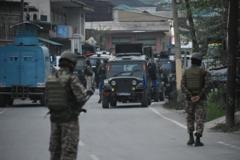In the wake of a devastating militant assault that resulted in the deaths of 25 Indians and a Nepali national, India has initiated a series of military strikes targeting locations in Pakistan and Pakistan-administered Kashmir. The defense ministry announced "Operation Sindoor," emphasizing its intention to hold those responsible for the April 22 attack accountable. Meanwhile, Pakistan vehemently denies involvement and labels India's actions as "unprovoked," with Prime Minister Shehbaz Sharif vowing that the aggression will not go unpunished.
India Launches Strikes in Response to Kashmir Attack, Heightening Tensions with Pakistan

India Launches Strikes in Response to Kashmir Attack, Heightening Tensions with Pakistan
India's military action against Pakistan follows a deadly attack on tourists, raising fears of escalating conflict in the region.
In recent statements, India's military confirmed strikes on nine sites believed to be related to terrorist infrastructure, while Pakistan claims the strikes have resulted in civilian casualties. The tensions unfolding between these nuclear-armed neighbors raise concerns of further escalation, reminiscent of the conflict over Kashmir that has persisted since the partition of British India in 1947.
India's decision to strike follows a turbulent period marked by escalating tensions between the two nations, particularly following the April upsurge of violence in the tourist destination of Pahalgam. The attack on civilians has provoked outrage in India, with Prime Minister Narendra Modi promising relentless pursuit of the assailants, believed by Indian police to include Pakistani nationals. Amidst the ongoing diplomatic fallout, there remain fears that this latest military action could result in further retaliatory measures, intensifying the longstanding conflict over Kashmir.
Kashmir continues to serve as a focal point for confrontation, granted partial autonomy until India's revocation of Article 370 in 2019, which has led to both increased militarism and tourism in the region. Historically, both nations have engaged in military conflicts over Kashmir, and past incidents have often triggered rapid escalations of hostilities, raising alarms within the international community.
Global leaders, including UN Secretary-General Antonio Guterres and former U.S. President Donald Trump, have urged restraint and immediate de-escalation to prevent a potential crisis in this volatile and contested area.
India's decision to strike follows a turbulent period marked by escalating tensions between the two nations, particularly following the April upsurge of violence in the tourist destination of Pahalgam. The attack on civilians has provoked outrage in India, with Prime Minister Narendra Modi promising relentless pursuit of the assailants, believed by Indian police to include Pakistani nationals. Amidst the ongoing diplomatic fallout, there remain fears that this latest military action could result in further retaliatory measures, intensifying the longstanding conflict over Kashmir.
Kashmir continues to serve as a focal point for confrontation, granted partial autonomy until India's revocation of Article 370 in 2019, which has led to both increased militarism and tourism in the region. Historically, both nations have engaged in military conflicts over Kashmir, and past incidents have often triggered rapid escalations of hostilities, raising alarms within the international community.
Global leaders, including UN Secretary-General Antonio Guterres and former U.S. President Donald Trump, have urged restraint and immediate de-escalation to prevent a potential crisis in this volatile and contested area.





















